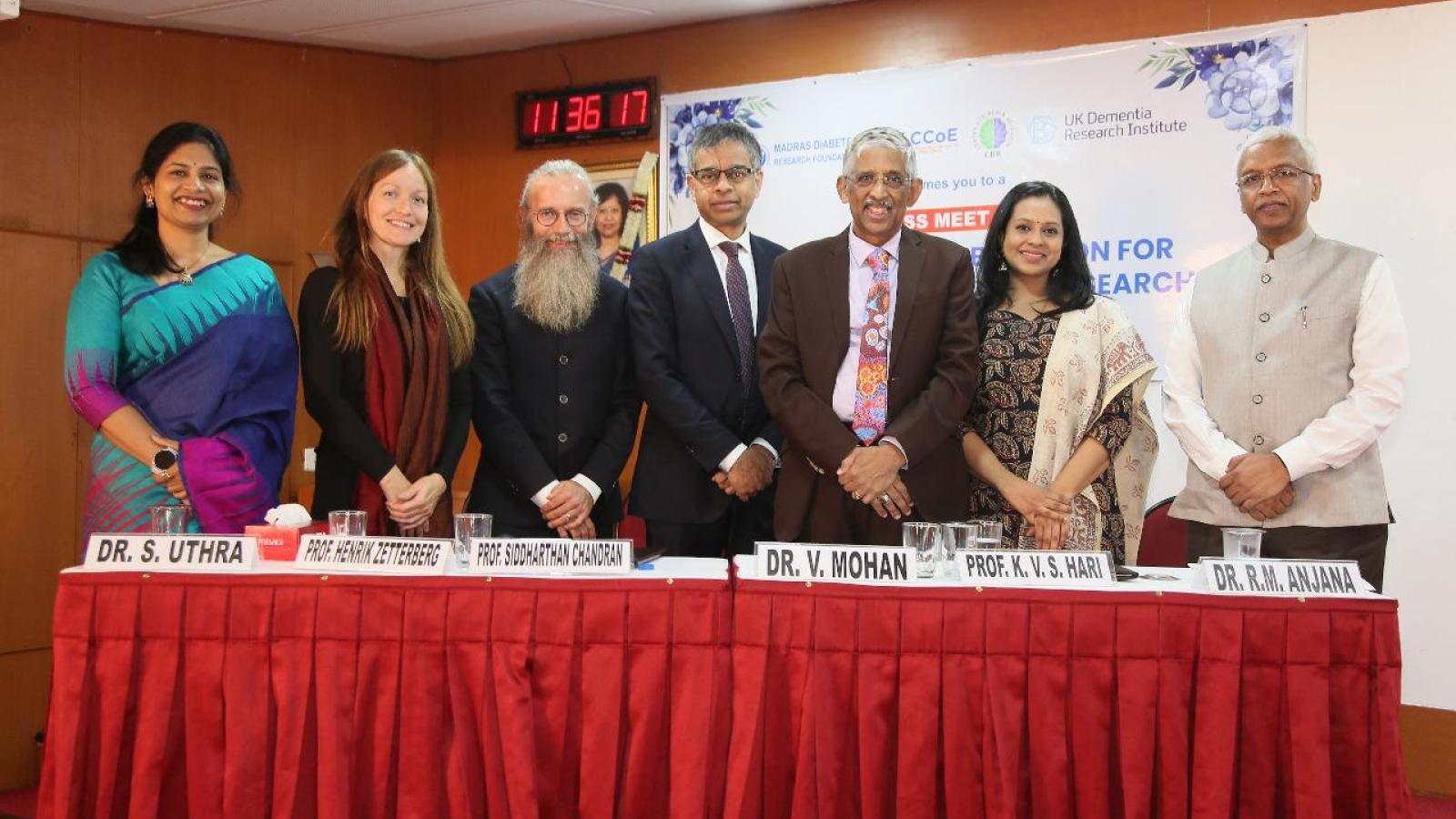The UK DRI is pleased to announce a new international collaboration with the Madras Diabetes Research Foundation (MDRF), Chennai, and the Centre for Brain Research (CBR) at the Indian Institute of Science (IISc), to advance cutting-edge research exploring the intricate relationship between diabetes and brain health.
The new agreement brings together leading experts in the fields of diabetes, neuroscience and dementia to understand how metabolic disorders like diabetes influence cognitive decline and neurological diseases, including dementia and Alzheimer’s disease. The partnership aims to facilitate large-scale studies, data exchange and translational research to improve early detection and prevention strategies.
People with type 2 diabetes have an increased risk of developing dementia, and diabetes is now recognised as one of 14 modifiable risk factors that together account for almost half of all dementia cases worldwide. Research suggests that for every five extra years someone has diabetes up to age 70, their risk of developing dementia increases. Despite this growing body of evidence, the mechanisms linking metabolic dysregulation to cognitive decline remain hugely understudied.
“Understanding how metabolic disorders influence brain function is one of the great scientific challenges of our time. Collaborations such as this with MDRF are crucial in uniting global expertise and resources to accelerate discoveries that can translate into real-world benefits for patients.”
Director & CEO
The MDRF, established in 1996 by Dr. V. Mohan and Dr. M. Rema, is now recognised worldwide as a premier research institute for diabetes and its complications. Through its affiliated Dr. Mohan's Diabetes Specialities Centre, MDRF uniquely integrates state-of-the-art clinical care with cutting-edge research. The foundation has conducted landmark epidemiological studies including the Chennai Urban Rural Epidemiology Study (CURES), which screened over 26,000 individuals and has resulted in more than 70 publications to date on diabetes prevalence, complications, and risk factors in India. This deep expertise in diabetes research, combined with access to extensive clinical datasets and biobanks, positions MDRF as an ideal partner for investigating the complex relationship between diabetes and brain health.
The collaboration also builds on the UK DRI’s ongoing partnership with the CBR, first established earlier this year. Most recently, the UK DRI and CBR announced a joint fellowship programme to focus on developing and scaling minimally invasive digital and blood-based tools and biomarkers that, when applied to India's diverse population cohorts, will accelerate understanding of dementias from identifying people at risk through to monitoring disease progression.
Prof Siddharthan Chandran, UK DRI Director, said:
“Understanding how metabolic disorders influence brain function is one of the great scientific challenges of our time. Collaborations such as this with MDRF are crucial in uniting global expertise and resources to accelerate discoveries that can translate into real-world benefits for patients.”
Prof Henrik Zetterberg, Head, Department of Psychiatry and Neurochemistry, University of Gothenburg, remarked:
“This collaboration represents an exciting frontier for dementia research. By studying metabolic factors and brain biomarkers together, we can gain deeper insights into disease mechanisms and identify novel intervention strategies.”
Dr V. Mohan, Chairman, Madras Diabetes Research Foundation (MDRF), said:
“This collaboration marks a milestone in our journey to understand how diabetes affects not just the body but also the brain. With our decades of work in diabetes and metabolic health, and by joining hands with eminent neuroscientists and dementia researchers, we hope to uncover mechanisms that will ultimately improve the quality of life for millions worldwide.”
Dr R. M. Anjana, President, MDRF, said:
“Diabetes is increasingly being recognized as a risk factor for cognitive decline and dementia. Through this partnership, we will leverage the strength of multi-disciplinary expertise and diverse datasets to uncover early markers of brain aging in people with diabetes. This could pave the way for preventive and therapeutic breakthroughs.”
Prof K. V. S. Hari, Director, Centre for Brain Research (CBR), IISc Bengaluru, said:
“CBR’s focus on brain ageing and neurodegenerative diseases aligns perfectly with this initiative. Working with MDRF and UK DRI will help integrate large-scale clinical, imaging and genetic data to identify key pathways linking diabetes and cognitive health.”
